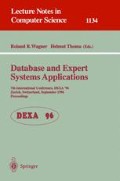Abstract
We consider in this paper interesting subclasses of partial stable models which reduce the degree of undefinedness, namely M-stable (Maximal-stable) models, which coincide with regular models, preferred extension, and maximal stable classes, and L-stable (Least undefinedstable) models, and we extend them from normal to disjunctive deductive databases.
L-stable models are shown to be the natural relaxation of the notion of total stable model; on the other hand the less strict M-stable models, endowed with a modularity property, may be appealing from the programming and computational point of view. M-stable and L-stable models are also compared with regular models on disjunctive deductive databases. It appears that, unlike on normal deductive databases, M-stable models do not coincide with regular models. Moreover, both M-stable and L-stable models satisfy the CWA principle, while regular models do not.
This author has been partially supported by Istituto per la Sistemistica e l'Informatica — Consiglio Nazionale delle Ricerche, ISI-CNR.
Preview
Unable to display preview. Download preview PDF.
References
K. Apt and H. Blair. Arithmetic Classification of Perfect Models of Stratified Programs. In Proc. of the Fifth Joint Int'l Conference and Symposium on Logic Programming (JICSLP-88), pp. 766–779. 1988.
C. Baral and V. Subrahmanian. Stable and Extension Class Theory for Logic Programs and Default Logic. Journal of Automated Reasoning, 8:345–366, 1992.
J. Dix. Classifying Semantics of Disjunctive Logic Programs. In K. Apt, editor, Proc. JICSLP-92, pp. 798–812. 1992.
P. Dung. Negation as Hypotheses: An Abductive Foundation for Logic Programming. In Proc. ICLP-91, pp. 3–17. 1991.
T. Eiter, G. Gottlob, and H. Mannila. Adding Disjunction to Datalog. In Proc. PODS '94, pp. 267–278, May 1994.
T. Eiter, N. Leone, and D. Saccà. On the Partial Semantics for Disjunctive Deductive Databases. Technical Report CD-TR 95/82, Christian Doppler Lab for Expert Systems, TU Vienna, 1995.
M. Fitting. A Kripke-Kleene Semantics for Logic Programs. Journal of Logic Programming, 2(4):295–312, 1985.
M. Gelfond and V. Lifschitz. The Stable Model Semantics for Logic Programming. In Proc. Fifth Intl Conference and Symposium, pp. 1070–1080. 1988.
A. Kakas and P. Mancarella. Preferred Extensions are Partial Stable Models. Journal of Logic Programming, 14:341–348, 1992.
V. Lifschitz and H. Turner. Splitting a Logic Program. In Proc. ICLP-94, pp. 23–38, MIT-Press, 1994.
J. Minker. On Indefinite Data Bases and the Closed World Assumption. In Proc. CADE '82, pp. 292–308, LNCS 138. Springer, 1982.
T. Przymusinski. Stable Semantics for Disjunctive Programs. New Generation Computing, 9:401–424, 1991.
R. Reiter. On Closed-World Databases. In H. Gallaire and J. Minker, editors, Logic and Data Bases, pp. 55–76. Plenum Press, New York, 1978.
K. Ross. Modular Stratification and Magic Sets for Datalog Programs with Negation. Journal of the ACM, 41(6):1216–1267, 1994.
D. Saccá. The Expressive Powers of Stable Models for Bound and Unbound DAT-ALOG Queries. Journal of Computer and System Sciences, 1996. To appear.
J. Schlipf. The Expressive Powers of Logic Programming Semantics. Journal of Computer and System Sciences, 51(1):64–86, 1995.
J. D. Ullman. Principles of Database and Knowledge Base Systems. Computer Science Press, 1988.
A. van Gelder, K. Ross, and J. Schlipf. The Well-Founded Semantics for General Logic Programs. Journal of the ACM, 38(3):620–650, 1991.
J.-H. You and L. Yuan. A Three-Valued Semantics for Deductive Databases and Logic Programs. Journal of Computer and System Sciences, 49:334–361, 1994.
J.-H. You and L. Yuan. On the Equivalence of Semantics for Normal Logic Programming. Journal of Logic Programming, 22(3):211–222, 1995.
Author information
Authors and Affiliations
Editor information
Rights and permissions
Copyright information
© 1996 Springer-Verlag Berlin Heidelberg
About this paper
Cite this paper
Eiter, T., Leone, N., Saccà, D. (1996). Partial semantics for disjunctive deductive databases. In: Wagner, R.R., Thoma, H. (eds) Database and Expert Systems Applications. DEXA 1996. Lecture Notes in Computer Science, vol 1134. Springer, Berlin, Heidelberg. https://doi.org/10.1007/BFb0034711
Download citation
DOI: https://doi.org/10.1007/BFb0034711
Published:
Publisher Name: Springer, Berlin, Heidelberg
Print ISBN: 978-3-540-61656-6
Online ISBN: 978-3-540-70651-9
eBook Packages: Springer Book Archive

